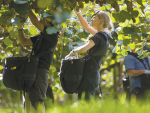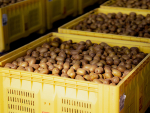The minimum wage increase set for 1 April will cut into the horticulture industry’s already tight margins and put increased financial pressure on a sector decimated by bad weather.
That’s according to Dataphyll chief executive Christoph Kistler who says some small growers could go under as a result of the change.
From 1 April 2023, the adult minimum wage will increase to $22.70/hour. The training and starting wage rates will increase from $16.96 to $18.16 per hour.
“We’re not saying don’t pay fair wages for a fair day’s work – pickers should be suitably compensated for their labours,” says Kistler.
“But this minimum wage increase will hurt not just small growers… ultimately it will hit the consumer in the pocket and deprive Pasifika of employment opportunities,” he says.
Dataphyll is an orchard management company that uses radio-frequency identification (RIFD) technology to create its harvest system (Dataphyll Grow) which is designed to help growers improve productivity, fruit quality, meet compliance obligations and measure picker performance.
In February, the Government announced its Growing Together 2035: Aotearoa Horticulture Action Plan Strategy, which included a goal for horticulture production to reach $12 billion by 2035. At the time, Agriculture Minister Damien O'Connor said that in 2023, the horticulture sector is expected to clock in at $7.1 billion.
However, Kistler says the new minimum wage increases would make the Government’s goal more difficult for the horticulture sector as more revenue will be funnelled into wages rather than being reinvested into expanding the industry to reach those targets.
“With all the additional costs horticulture businesses have this year, with the supply chain and the follow-on consequences of Cyclone Gabrielle and other weather events, this policy change puts more pressure on small growers especially,” he says.
He adds that even before the policy changes, wages often constituted 60% or more of a grower’s costs in a sector with slim margins.
Growers also employ seasonal workers from the Pacific Islands, many of whom are paid the minimum wage as the job of picking produce is relatively manual. He said the new minimum wage increases would significantly impact growers' ability to hire seasonal workers.
Kistler says growers use various systems to pay their workers, including by the kilogram, hourly rates and bucket rate.
While the bucket rate is common, it is open to disputes as it is easily manipulated.
For many, the hourly rate is the most straightforward system to manage.
“Growers that pay by bucket or hourly are affected by the minimum wage increases as the pay rate must be adjusted when the worker's pick rate compensation may fall below what they would have earned on an hourly wage," Kistler says.
Kistler does have some tips for growers struggling to cope with volatile times:
- Be transparent
Paying workers correctly works both ways. Depending on which payment structure growers use, there is always a risk of overpaying or underpaying pickers. On the other hand, even slight manipulation of worker picking rates can eat into a grower's margins, putting the entire farm at risk of insolvency.
"Developing trust and honesty on both sides—workers and growers—will be paramount over the next few seasons. Build trust with workers as a grower, but also workers must be more aware of the risk of having no job if they falsify their pick rates," Kistler says.
- Incentivise
It's an old economic maxim that people respond to incentives. The same will be valid for workers as growers compete for the most trustworthy and productive pickers.
"Workers need to be incentivised to perform well. If margins are tight, incentivisation could include little perks beyond just remuneration. But growers also need systems that incentivise staff to conduct easy and accurate record-keeping," he says.
- Automate
Should the wage increases cut deeper into growers' margins, shuffling costs and trimming where possible is advisable until the broader market absorbs the wage rise.
"Or consider investing in more automation at the orchard level—some growers have been able to halve their picker requirements through automation.”


















